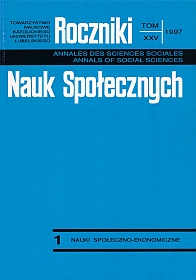The Moral Perspective of Social Life in Peter Winch’s Interpretation
Abstract
The paper presents the moral perspective on social life in Peter Winch’s interpretation. The fact that Winch is involved in ethical problems in the context of philosophical considerations on social issues results from his methodological assumptions, according to which he renounces normative (absolutistic, structural) paradigm of the way to perceive social reality. According to this paradigm the social world is made of structures being „without” the awareness of its members. He is for the interpretative (phenomenological) paradigm in which social reality is determined by the situation, including ethical-moral situation. Winch introduces the category of morality, making the form of social life dependent upon the accepted values, being revealed in concrete instances of people influencing one another. Now he renounces the analyses of social life which perceive it mainly in the categories of a struggle for power. The latter’s sanction is to deal with political arrangements and legal decrees, yet does not need any moral justification and avoids any ethical qualifications. Winch opposes reductionism, a reductionism which leaves normative elements out of considerations on social life. He also attempts to rehabilitate practical philosophy, a philosophy that again opens a possibility to consider social life in ethical categories, fulfills formative functions, and has a character of wisdom, not theory.
Copyright (c) 1997 Roczniki Nauk Społecznych

This work is licensed under a Creative Commons Attribution-NonCommercial-NoDerivatives 4.0 International License.


